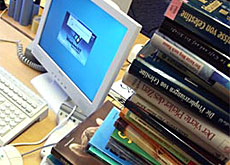Schools negotiate the internet maze

Teaching pupils how to access the worldwide web and use the latest information technology has become a top priority for Swiss schools.
More than 2,000 schools are currently logged on to the internet, and the authorities plan to more than double this number by 2005.
One institution already benefiting from internet access is Wettingen high school, which is based in an ancient monastery.
The 800-year old monastery, which is surrounded by grazing sheep, lush meadows and vineyards, has housed the school for almost 30 years and has been refurbished and redesigned.
The teachers, as well as most of the pupils, are convinced that new media is an important part of their daily lessons, despite the fact that not every classroom is equipped with a computer.
The unconverted
But there are still a few who have yet to be converted.
“Even though the internet takes you directly to the information you need, it has not really made studying easier,” Eliane Küpfer, a pupil at the school, told swissinfo.
“Sometimes there is too much information on a subject and that’s why I prefer working with books.”
Her colleague Patrick Kaspar agrees: “I think it is useful but it can be difficult to sift out the right information.”
Even deputy dean Claudio Pegolo admits it can be difficult finding the right information in a short period of time. He prefers a combination of the old and the new.
“It’s easier if you use both media together – the good old library and the internet – as one needs the other,” he said.
Breaking borders
History teacher Hansjörg Frank says the internet has opened up new possibilities in the classroom, adding that some of his pupils have contacted Palestinians and Israelis via the web.
While increasing awareness of the Middle East situation, the exercise also served to illustrate the digital divide between the haves and the have-nots.
“It was a lot more difficult to get in touch with Palestinians than with Israelis,” Frank told swissinfo.
“I think it is due to a lack of infrastructure in the Palestinian territories; it showed my pupils that there is definitely a divide.”
Internal communication
Every pupil at Wettingen high school has an email address and can send homework to teachers or exchange papers or information with other pupils.
“We also use email for team teaching, which makes the life of the organisation a lot easier,” said geography teacher Peter Stirnemann.
His colleague Samuel Ginsburg, who teaches biology, is considered a pioneer when it comes to working with new media at the school.
He takes pictures of experiments and uploads them on a special server, where he also stores teaching material.
Daunting challenge
But Ginsburg is also aware that the web can be a daunting and confusing realm for the uninitiated.
“It’s important for young people to learn how communication technology works, as that’ll encourage them to do it themselves,” he added.
And it is not just the pupils who are seeing their world turned upside down: the technological revolution has also changed the way teachers work.
“We are no longer the ‘know-it-alls’. We have become facilitators who ask critical questions,” revealed Ginsburg.
swissinfo, Gaby Ochsenbein, Wettingen (translation: Billi Bierling)
Almost 1,000 pupils attend Wettingen school in canton Aargau.
The school employs 132 teachers.
The cantonal school consists of a high school (four years) and a secondary school (three years).
Up until 1841, it was a working monastery.
More than 2,000 Swiss schools are connected to the internet. Swisscom is planning to raise this number to 5,000 by 2005.
The schools rely on cooperation between the federal government, cantons and private industry to connect to the web.
Schools want the government to pay for teacher training, and private companies to set up the infrastructure and bandwidth.

In compliance with the JTI standards
More: SWI swissinfo.ch certified by the Journalism Trust Initiative

You can find an overview of ongoing debates with our journalists here . Please join us!
If you want to start a conversation about a topic raised in this article or want to report factual errors, email us at english@swissinfo.ch.